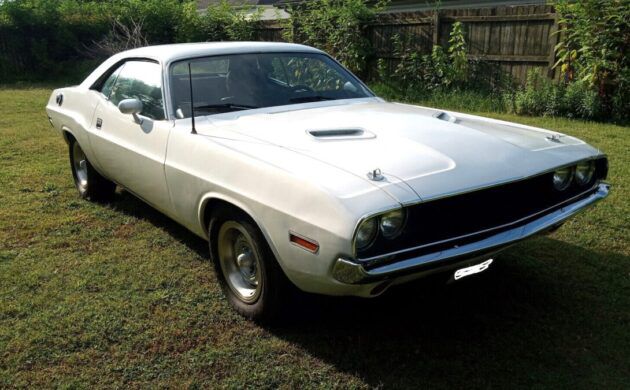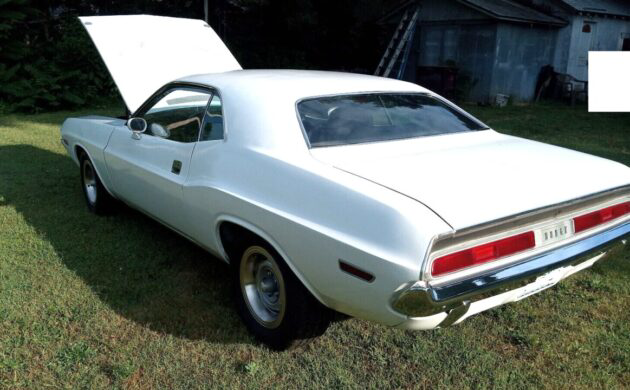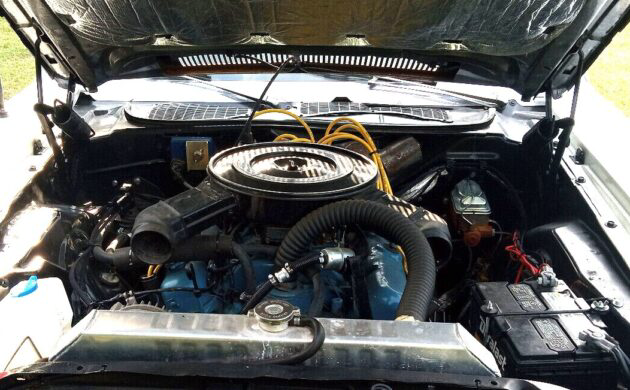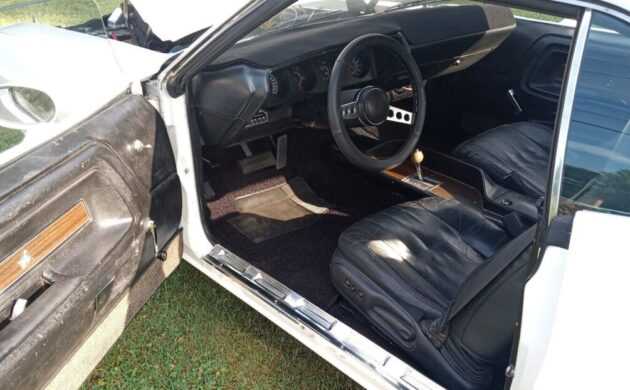Dodge was the last major U.S. auto manufacturer to get into the lucrative “pony car” market. Introduced in 1970, it shared the new E-body platform that the Plymouth Barracuda had been long waiting for. Production numbers would peak in the first year and then decline until 1974 when Chrysler got out of the sector. This ’70 Challenger SE has been rebuilt by the seller, having acquired it as a roller needing loads of work. But a few more things still need to be done, so this should be considered a work-in-progress that’s located in Springfield, Missouri. It’s available here on eBay where no reserve is applicable and the bidding has reached $16,300.
Nearly 77,000 Challengers were built in 1970, some 50% greater than the Barracuda. According to the partial VIN the seller has provided, this SE left the factory with a 383 cubic inch V8 using a 2-barrel carburetor. But that had disappeared by the time the seller acquired the Dodge, and he/she elected to go with a rebuilt 318 as a replacement that has been tweaked for greater performance. The transmission and most of the interior were also MIA, so the seller had his/her work cut out.
The list of things that have been done to the car is rather extensive. That includes new floors, trunk pan, and upper cowl. Add to that new wiring ($1,000 expense alone), a rebuilt 904 automatic tranny, rebuilt rear-end, and some new suspension components, brakes, fuel tank, wheels, tires, and much, much more. The bucket seats came out of a Chrysler Sebring and are powered operated, and a new headliner was installed, but it doesn’t look to have been well done.
The to-do list has two big items on it. The paint has been redone but cheaply and is not that good. Also, the car came with factory air conditioning when new, but all the plumbing and hardware have flown the coop. So, this all boils down to a project car that you could drive when you continue to fix it up. It won’t ever be a number-matching automobile but looks a lot like the car that Kowalski drove in the 1970s movie, Vanishing Point (who remembers that cool flick?).









Why one never removes Fender Tags.
I would have at least reattached immediately at best.
That headliner is the worst. Hopefully cN pull down and start over. I am really good at headliners .
The bosy looks great as the underneath.
A good start to now do the little things.
Did some van conversion work – not good at it. Respect your skill.
Mopar people know what a SE is. The rear window was the same as any Challenger made. The special vinyl top would go over the sides and top of the window to make it look smaller. The headliner was special also to make the window look smaller. The SE emblem where on the vinyl quarter area. Inside had a overhead console. This Challenger had the vinyl top removed so can’t tell if it a true SE and the headliner was changed. The fender tag is the bible for the truth. This came with a 383-2. A SE came also came with 318 ,440-4 ,440-6 and Hemi!! The larger engine where RT pkg. The seller did a good job putting the Challenger together. The steering wheel is from a 73 model. The next owner needs to get that fender tag if they want to put this back to a SE.. 🐻🇺🇸
Correct on the smaller SE rear window. I used to have a 70 R/T SE 383 Magnum. 727 auto, 904 is the manual.
I believe a 904 is an automatic. Have them in 2 challengers.
A-727 is HD, A-904 is LD, automatics. One could get an A-727 on a slant six for taxi and police duty, I am not aware of an A-904 with a big block bell housing. A-833 is a standard 4-speed, there were several versions for 6’s and V8s with different gear ratios. All had 23-spline input shafts except the Hemi, which had 13 (I think). There were several LD and HD 3-speeds with and without syncros on first. I know the A-230 was a LD, no syncro tranny, there was an A-320 (I think), HD and with syncros and there was one more without syncros but I forget the number. The A-833 OD had an aluminum case and was offered with an overdrive third gear and the shift lever inverted on the tranny so that the shift pattern felt normal. When the driver shifted into what they thought of as third they had a 1:1 direct drive.
904 is the automatic for the smaller engines.
A-833 manual I think.
My 1970 Challenger SE came from the factory with a 383-2 barrel.
Fish, exciting!!
Not the same window, they had a insert with the smaller glass that screwed into the original opening and the covered by the vinyl.
Big Bear. The SE Challengers’ have a fiberglass filler piece with a smaller rear window that is screwed into the full size rear window opening under the vinyl roof. I can go out to my shop and take a picture of an unrestored SE Challenger if you are interested.
Here’s a picture of an SE rear window and filler for sale now on EBay. THis link to the sale will show you exactly what an original SE window and filler look like on both sides. https://www.ebay.com/itm/334581177391
And, here is a picture of it mounted on the car and covered with vinyl. The fiberglass insert is plainly visible.
I think you will find that the 29 in the VIN is the roof code and denotes the formal roof package which is what made it a Special Edition (SE) in 1970.
The VIN listed in the e-bay ad is: JH29L0B
I thought my 70 SE came with a 383-4. Memory might be off. Fun, fast car though. White alligator top.
Where’s Kowalski????
I don’t think ANYONE saw that ending coming. We all know it was a Camaro that hit the dozers, but I doubt anyone breathed for 30 seconds after that.
Maybe to a lesser degree, also the ending of “Dirty Mary, Crazy Larry” ‘s Charger
Recently passed away, unfortunately. (Barry Newman)
Sad to hear. Probably less than a blip in the news as he didn’t lead a tabloid life.
Where’s that fender tag? Should have located that first before listing.
Otherwise, we’d leave it as-is, and drive it like Kowalski.
Why put a 318 into a big block car?
Depends on when it was done. In the mid to late 70s there was little demand for big engines needing premium due to gas shortages. Sold my 383 Challenger for $450 in 1974–lucky to get that much. Bought a 318 Charger, slow but fairly economical.